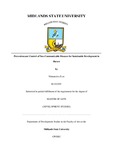Please use this identifier to cite or link to this item:
https://cris.library.msu.ac.zw//handle/11408/1996Full metadata record
| DC Field | Value | Language |
|---|---|---|
| dc.contributor.author | Zuze, Ndanatsiwa | - |
| dc.date.accessioned | 2017-06-10T13:39:11Z | - |
| dc.date.available | 2017-06-10T13:39:11Z | - |
| dc.date.issued | 2014 | - |
| dc.identifier.uri | http://hdl.handle.net/11408/1996 | - |
| dc.description.abstract | The research study sought to explore the connection between NCDs prevention and control and sustainable development in Harare. The purpose was achieved through exploring the NCD health care system, the existing environment for prevention and control of the NCDs and also documenting how the population is being engaged in NCDs prevention and control activities. The methodology that the researcher adopted was the qualitative research method. In depth interviews, observations and focus group discussions where the data mining instruments that were employed. Purposive sampling method was used to select a sample and network sampling and snowballing were used to obtain the required sample. Collected data was analyzed and placed into 5 themes i.e. accessibility of services, existing partnerships, activities for prevention and control of NCDs, and healthy environments. It emerged from the findings that prevention and control activities are being hampered by financial challenges, the existing environment is not conducive for prevention thus the district is experiencing an increase in the numbers of people with NCDs with diabetes and hypertension being the most common. The approach that is being used to control NCDs is not sustainable as treatment is being preferred instead of prevention. Management of the health services system is not efficient. Those with NCDs such as cancer and heart diseases are experiencing difficulties accessing screening, treatment and care services. All this results in increasing numbers of those with NCDs and it exerts pressure on household finances and the health delivery system to such an extent that it becomes unsustainable. As a result researcher recommended partnerships for health, introduction of public transport system that encourages physical exercise and regulation that governs food production, processing and labelling, tobacco smoking and alcohol production. | en_US |
| dc.language.iso | en | en_US |
| dc.publisher | Midlands State University | en_US |
| dc.subject | NCDs prevention | en_US |
| dc.subject | Sustainable development | en_US |
| dc.title | Prevention and Control of Non-Communicable Diseases for Sustainable Development in Harare | en_US |
| item.fulltext | With Fulltext | - |
| item.languageiso639-1 | en | - |
| item.grantfulltext | open | - |
| Appears in Collections: | Master Of Arts In Development Studies | |
Files in This Item:
| File | Description | Size | Format | |
|---|---|---|---|---|
| NDANATSIWA ZUZE FINAL DISSERTATION.pdf | Full Text | 1.02 MB | Adobe PDF |  View/Open |
Page view(s)
100
checked on Jan 1, 2026
Download(s)
60
checked on Jan 1, 2026
Google ScholarTM
Check
Items in MSUIR are protected by copyright, with all rights reserved, unless otherwise indicated.



